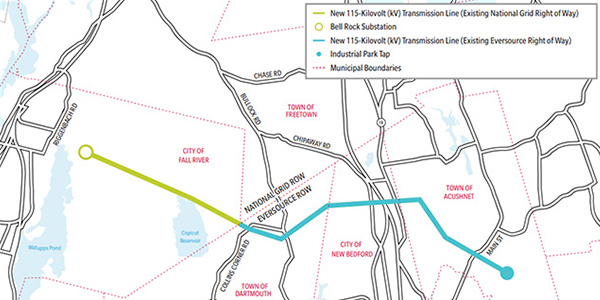NEPOOL’s Transmission Committee last week focused on how to apply transmission charges to a storage resource when it is charging for later resale in wholesale markets and not providing a service.
The discussion came nearly a month after FERC “approved the vast majority” of the Tariff changes ISO-NE proposed in response to Order 841, according to the RTO’s principal analyst for market development, Catherine McDonough, but the commission also required a further compliance filing by Jan. 22, 2020 (ER19-470).
In previewing the RTO’s likely response, McDonough said the order indicated that energy storage resources’ (ESRs) behavior is similar to other load-serving entities when charging to resell at a later time, meaning transmission costs should apply.
“However, it also indicated that ESRs should not be subject to transmission charges when they’re dispatched by the ISO to provide a service because the physical impacts on the bulk power system are comparable to a traditional generator’s that provides the same service,” she said. “The order also indicated that assessing transmission charges would create a disincentive for those resources to provide the service.”
[Although NEPOOL rules prohibit quoting speakers at meetings, those quoted in this article approved their remarks afterward to amplify their presentations.]
ISO-NE is anticipating both adding language to section III.1.10.6 of the Tariff to enumerate the services that will result in the transmission charge exemption and expanding its explanation regarding why exempting electric storage facilities from transmission charges is justified given the policy direction set out in Order 841, McDonough said.
The additional Tariff revisions will be discussed and voted on at the Jan. 14-15, 2020, Markets Committee meeting.
Order 1000 Reliability Exemptions
NEPOOL Counsel Eric Runge notified the committee of proceedings instituted by FERC in October into ISO-NE, PJM and SPP about their Order 1000 exemptions for reliability projects that are determined to be needed within three years to address a reliability need (EL19-90, EL19-91, EL19-92).
The commission contends that ISO-NE and the other grid operators appear to be thwarting Order 1000’s intent to open transmission projects to competition by abusing the “immediate need” exemption for reliability projects. (See FERC to Probe Order 1000 Competition Exemptions.)
Each respondent must “demonstrate how it is complying with the immediate-need reliability project criteria; demonstrate that the provisions in its tariff, as implemented, containing certain exemptions to the requirements of Order No. 1000 for immediate-need reliability projects remain just and reasonable; and consider whether additional conditions or restrictions on the use of the exemption for immediate need reliability projects are necessary,” Runge’s memo said.
NEPOOL’s Participants Committee last month filed a status report with FERC stating that some stakeholders have raised concerns about the lack of competitive transmission projects and the implementation of the three-year exemption, while others have noted the importance of implementation details to the achievement of commission policies.
“Some participants have raised the concern that, under ISO-NE’s implementation of the short-term exemption, very few reliability upgrades might be subject to competitive processes … and some of the intended benefits of Order 1000 might not be realized,” NEPOOL said, adding that the stakeholder discussions continue.
Runge also notified the Transmission Committee of FERC Opinion 569 on base return on equity methodology, including its background and a high-level summary of its key determinations.
The commission in November adopted a new methodology for calculating ROE for transmission owners and applied it to two FERC Adopts ROE Methodology in MISO Complaints.)
The Transmission Committee also confirmed Jose Rotger, of ESAI Power, as its vice chair for 2020.
— Michael Kuser




